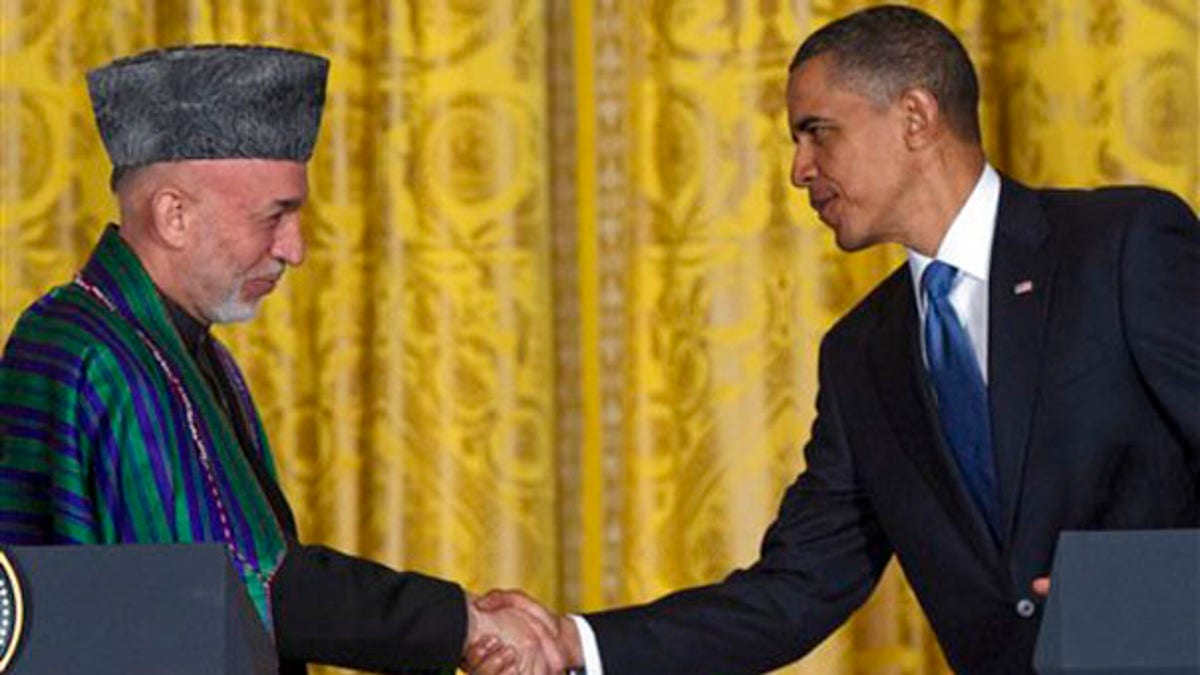
President Obama shakes hands with Afghan President Hamid Karzai during a news conference at the White House on May 12. (AP Photo)
Both America’s and Afghanistan’s presidents needed to hit the “reset” button to prevent the collapse of their tense, nearly ten-year marriage. Barack Obama and Hamid Karzai had to emerge from their White Hose counseling session asserting that their partnership was back on a path of reconciliation.
So they did. But can we believe them?
At a joint appearance before the White House press corps today – reporters weren’t able to ask enough questions for this to be considered an actual news conference – both presidents said they wanted their relationship to endure and prosper. Each acknowledged the obvious: mistakes had been made; overly harsh words had been spoken.
But President Obama insisted that his commitment to Afghanistan’s stability and development was “long-term” and would not flag after next summer, when he has pledged to start withdrawing American “surge” forces from Afghanistan.
For his part, Karzai promised to exercise “dedication and extreme care” to ensure that American economic aid to Afghanistan was “spent well.” That’s diplo-speak for a promise to rein in the corruption that has alienated not only Afghans but also his patrons in Washington and America’s NATO allies. Karzai also paid tribute, belatedly, to the American soldiers who have already died or been wounded to keep his country from sliding back into the most militant of Taliban hands.
Behind the happy talk and handshakes (there were no bows this time), however, huge problems make the prospects of success in Afghanistan dicey.
First, there is continuing confusion over America’s mission in Afghanistan and its relationship to the broader goal of stabilizing Pakistan. As Brian Katulis, a senior fellow and Middle East expert at the Obama-supportive Center for American Progress, put it: “How does this war end? What is the desired sustainable end state in Afghanistan?”
Or in Pakistan, for that matter.
After day two of Karzai’s four-day visit, we don’t know. We still have no idea, for instance, how much the mission in Afghanistan will cost (much less Af-Pak), what kind of institutions we need to create and sustain there, or how progress towards these goals will be measured. Whenever Mr. Katulis and other analysts have tried to pry concrete answers out of the self-proclaimed most “transparent” administration in history, we have failed. Our e-mails go unanswered, or we get vague generalities about the importance of implementing our military’s counterinsurgency doctrine (COIN) of “clear, hold, build.” COIN mantras, Katulis writes in “Foreign Policy,” are uttered “like a religious creed.” Are Afghans really benefitting from the $50 billion that the U.S. has already appropriated for reconstruction alone – much of which has apparently disappeared into the deep pockets of the Karzai family, cronies, and other friends? Are they also likely to benefit from the additional $20 billion that Obama has requested? The total spending, according to the Congressional Research Service, is double what Washington spent in postwar Germany, Katulis observes, and more than four times what was spent, adjusted for inflation, in Japan.
I haven’t been back to Afghanistan for several years. But friends and analysts who have been there are deeply pessimistic. America’s recognition of Karzai’s fraud-filled election as “democracy” is a sad joke, they say. Several also see danger in Karzai’s much touted “peace jirga,” his planned negotiations with the more pragmatically inclined Taliban. Washington must ensure that Karzai does not go too far in accommodating supporters of a movement whose alliance with Usama bin Laden’s Al Qaeda prompted America’s post-9/11 invasion in the first place.
Finally, despite the White House’s red carpet treatment of the always sartorially splendid Afghan president, American officials must continue insisting – privately, since public criticism or “tough-love” seems to have backfired – that Karzai end the rampant corruption, thuggery, and nepotism that have infuriated so many. At very least, he must be persuaded to remove his allegedly corrupt, drug-dealing brother in Kandahar, where a major American “clear, hold, and build” operation is scheduled to begin soon. Before Obama asks another American soldier to risk his or her life to keep Hamid Karzai in power, let’s do whatever it takes to ensure that our soldiers are not being endangered for nothing.
Judith Miller is a writer, Manhattan Institute Scholar and Fox News contributor.
Fox Forum is on Twitter. Follow us @fxnopinion.
